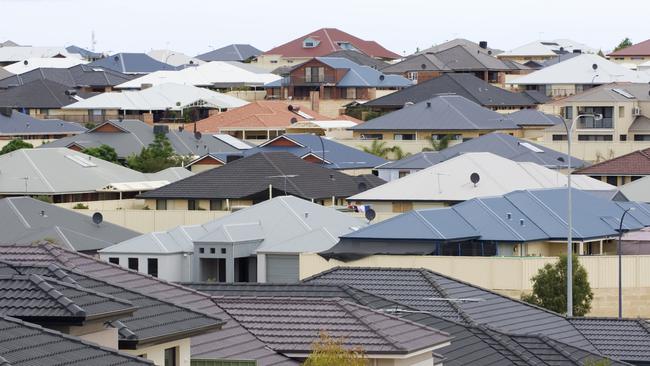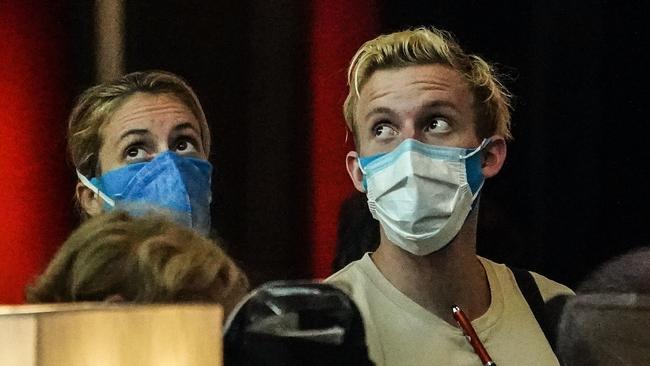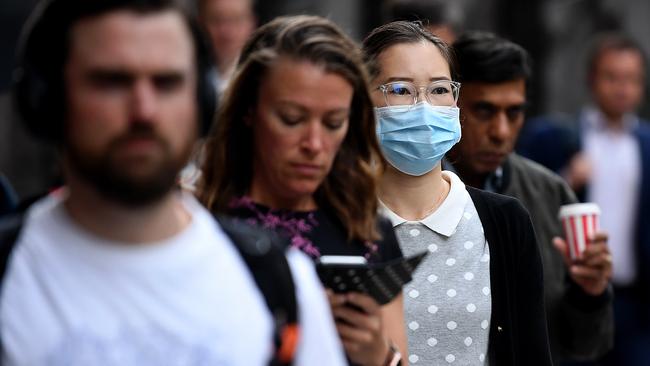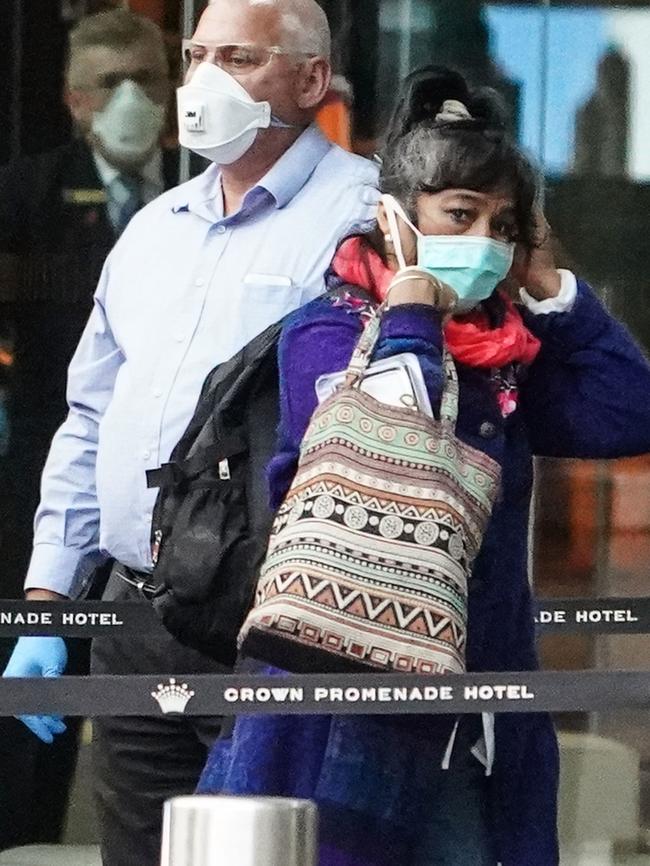Coronavirus Australia: PM announces six-month moratorium on evictions as renters and landlords pushed to breaking point
Prime Minister Scott Morrison has announced a six-month moratorium on evictions as some fear they can’t afford the roof over their heads.
Business
Don't miss out on the headlines from Business. Followed categories will be added to My News.
Prime Minister Scott Morrison has announced a six-month moratorium on evictions.
After Sunday night’s National Cabinet meeting, the PM said it had been decided that governments would excuse people or businesses who were unable to meet rental commitments as a result of financial distress.
“State and Territories will be moving to put a moratorium on evictions of persons as a result of financial distress if they are unable to meet their commitments,” he said.
“And so there would be a moratorium on evictions for the next six months under those rental arrangements.”
RELATED: Follow the latest coronavirus updates
RELATED: Government hints at renters’ relief package
RELATED: How landlords and tenants can avoid a financial hit
Mr Morrison said there would be more details to come regarding decisions made on commercial and residential tenancies discussed at tonight’s meeting, saying the National Cabinet had agreed “on a series of principles, which I will release through a statement”.
He also indicated there was more work to be done to resolve tenancy issues, not only by the Government but by businesses, landlords and banks.
“My message to tenants, particularly commercial tenants, and commercial landlords, is a very straightforward one - we need you to sit down, talk to each other and work this out about looking at the businesses which have been closed, businesses that may have had a significant reduction in their revenues.
“We need landlords and tenants to sit down and come up with arrangements that enable them to get through this crisis so on the other side, the landlord has a tenant which is a business that can pay rent, and the business is a business that can re-emerge on the other side of this and be able to go on and employ people on the other side of these arrangements.”
It comes as a spike in unemployment in Australia due to the sudden coronavirus outbreak has seen a sharp increase in calls for relief, as thousands of households struggle to stay afloat.
Despite Mr Morrison’s announcement, renters and owners are still waiting for a full update on the government’s proposed relief package for Australians struggling to afford housing.
In such trying times, public pressure is mounting for Prime Minister Scott Morrison to move quickly on a relief package before they’re forced on to the streets.
Those attempting to provide advice and advocacy over the last tense few weeks have seen demand skyrocket, their organisations overrun by people seeking help.
“People are very worried and scared so they’re contacting us to try and find out what’s happening, to get some assurance. But it’s really about if they aren’t able to pay their rent,” Leo Patterson Ross, a senior policy advisor for the Tenants’ Union NSW, told news.com.au.
“They don’t want to be in arrears, it’s a bad feeling if you’ve gone back on a contract. But if paying their rent leaves them without money for food, for healthcare, things like that – that’s very worrying to them.”


With the real prospect of unemployment rates rising to a record 15 per cent, and median rent on a Sydney or Melbourne house sitting between $400 and $500 a week, the pandemic has people more than panicked.
Inability to maintain stable and secure housing is just one of the many social issues that people and communities are facing due to the crisis, according to the peak body for community legal centres in NSW, of which the Tenants Union is a member.
It is advocating urgent government action in a range of areas, from making permanent the temporary increase to income support payments to ensuring remote Aboriginal communities have adequate resources and health infrastructure in place to manage an outbreak.
In terms of housing, Mr Patterson Ross says his entire network – which services between 25,000 and 30,000 tenants a year – has already seen an uptick after some chaotic weeks.
“The traffic on our website has more than doubled. We normally get about a million sessions a year on our website – people looking for fact sheets and advice and looking for their local services. So there’s a huge volume coming through.”
Along with 70 other organisations and researchers we are calling for Commonwealth, State and Territory governments across Australia to put an immediate stop on evictions.#Covid2019Au#NoEvictionsCOVID19https://t.co/IE4vcLGx0G
— Tenants Union of NSW (@TUNSW) March 18, 2020
While the public are aware of the government’s promise to ease pressures on both owners and renters in some way, Mr Patterson Ross says all the uncertainty has people re-prioritising their spend.
“In terms of the weekly spend for most households, the housing cost – whether it’s rent or a mortgage cost – is usually the biggest single spend,” says Mr Patterson Ross.
“But it’s clear that food and healthcare are more important things. And that’s why our organisation and others have been asking the government, ‘How can we set up a system where we don’t come out of this at the end with everyone having great arrears debts or bigger mortgages? How do we make sure that the whole community can bear the cost of this in a fair way, as well as how can we all join in the recovery?’”

Some are reluctant to wait it out while the government formulates a plan, but Mr Patterson Ross warns that could lead to more harmful outcomes.
“Obviously, you might get evicted for having the rent arrears at all. And that’s obviously not good when you’re trying to avoid a health crisis and the government’s advising you to stay home.”
“People are looking at breaking their lease because they’re scared of the ongoing rent arrears debt, but that means they’re taking on the compensation that usually goes to the landlord. In NSW, this is often four or six weeks’ rent. And it can be a lot higher depending on which system of compensation they’re under.”
Still, some are desperate enough to take the risk rather than bet on government assistance.
“We have been trying to tell them the government will make an announcement, at least wait until then and make an informed decision. But some are taking on that debt and they’re leaving the property now because they probably don’t have a lot of faith in the government to act. And they’re thinking, ‘I had better cut my losses now.’ But that might mean that they actually end up with a bad tenant database listing and that can last for three years. That’s going to make it difficult for them to get back into a new home, or find stable employment.”
#ICYMI: "There's a big difference here between intentionally holding your rent... and simply having no money to give."
— ABC The Drum (@ABCthedrum) March 27, 2020
Currently renting? @LeoPatRoss from @TUNSW explains your rights, during this #coronavirus outbreak. #TheDrum pic.twitter.com/lFSs6dlwwY
The last few weeks have seen throngs of people from the same industries – i.e. tourism, hospitality, retail and entertainment – reaching out to Mr Patterson Ross’ organisation after the pandemic began decimating the economy.
“Now we’re starting to see people from associate industries. We’re starting to see the flow on effect with a lot of casuals and contractors coming through.”
At the moment, the advice is still for people to wait for the government to deliver on their promise.
“And contact your local MP, tell them what you need,” says Mr Patterson Ross.

In the meantime, the Tenants’ Union and others have been fostering open communication between landlords and tenants.
“Talk to your landlord about your ability to pay – especially if your income has reduced, not disappeared – so that they understand and they can try and put measures in place.”
“Some landlords have come to the table and shown that they understand, and unfortunately there’s a large portion who haven’t,” Mr Patterson Ross admits.
“This is a whole community problem, the whole community has a role to play here. And that means banks as well as landlords will have to realise their incomes may be affected and reduced, as workers have been affected.”
My friend who has a large successful cafe, and her other 2 neighbouring shop tenants, were all contacted by their mutual landlord last Wednesday.
— ð‘ð¨ð§ð§ð¢ ð’ðšð¥ð (@RonniSalt) March 28, 2020
She has given them all 6 months free rent and is paying their rates & insurance.
We need to share the good stories. #COVID19Aus https://t.co/ZeY31ToXyx
Advocates for renters want to see some kind of reduction in housing costs as well as an immediate stop to evictions until the crisis is over.
“A temporary stop on all evictions for the health crisis, because it is about stopping the spread. If someone gets evicted, they’re out in the community looking for a new home, they might be meeting with friends and family, they might be approaching homelessness services – so all evictions are bad in the short term. But we also need to see a response to the economic crisis, and that’s where we need to see the rent arrears and mortgages being addressed.”
Constitutionally, states retain responsibility for tenancy law and will have to take the lead on this. But the federal government will most likely step in at some point to ensure consistency across all states.
“If we can keep people spending less on housing and more on other things – groceries, healthcare, deliveries, online shopping, whatever it may be – we can see that chain effect and see wages keep flowing in those industries.”
Originally published as Coronavirus Australia: PM announces six-month moratorium on evictions as renters and landlords pushed to breaking point


